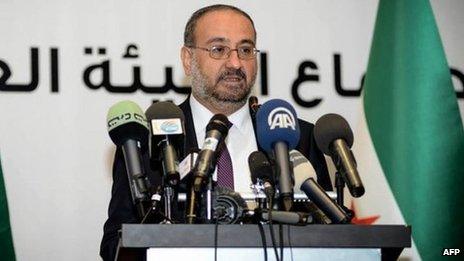Profile: Ahmed Tomeh
- Published

Mr Tomeh's primary responsibility will bringing order to Syria's rebel-held areas
Ahmed Tomeh, a 48-year-old dentist and former political prisoner, has been tasked by Syria's main opposition alliance with forming an interim government to administer rebel-held areas.
He was elected prime minister by the National Coalition for Syrian Revolutionary and Opposition Forces on 14 September, two months after his predecessor Ghassan Hitto resigned due to his failure to name a cabinet or co-ordinate the provision basic services and supplies.
Mr Tomeh was said to be a consensus candidate accepted by a secular-leaning coalition with the alliance and the Syrian Muslim Brotherhood.
Damascus Declaration
Before leaving for Turkey in 2012 after his latest detention, Mr Tomeh spent most of his life in the eastern Syrian city of Deir al-Zour.
According to a biography published by the National Coalition, his political career began in 1992, when he helped set up a peaceful resistance group in Deir al-Zour. He began to preach Friday sermons at mosques in 1997, but was stopped after two years by the authorities.
In 2001, Mr Tomeh joined the Committee for the Revival of Civil Society in Syria, which campaigned for democracy, the release of prisoners of conscience, and the protection of human rights.
Mr Tomeh was one of the founders of the Damascus Declaration for Democratic National Change (DDDNC), a coalition of political parties, human rights groups and pro-democracy activists named after a 2005 document that demanded Syria's transformation from a "security state to a political state".
He was registered with the DDDNC as an independent nationalist and in 2006 was elected Deir al-Zour's representative.
In December 2007, Mr Tomeh became the DDDNC's secretary general. One week later, he was detained with several other leaders of the coalition and sentenced to two-and-a-half years in prison.
'Immense challenges'
He was released from jail in June 2010, nine months before the start of the uprising against President Bashar al-Assad.
Mr Tomeh participated in the anti-government demonstrations and attended opposition meetings that began to take place in Deir al-Zour at the end of March 2011.
In July 2011, he was arrested in his dental clinic and imprisoned for a month for inciting protests and criticising the government in the media.
He joined the Syrian National Council, coalition of exiled opposition groups, at its formation in October 2011, under the pseudonym "Ahmed al-Saih". But he quit the SNC before long due to his inability to attend meetings and participate effectively in its activities.
When the opposition formed local councils to help administer rebel-held areas of Syria, he advised the one based in Deir al-Zour.
After his election as interim prime minister by the National Coalition, Mr Tomeh promised in a speech that his government would "restore order and security, protect people's property, revive the economy and invest in national resources to serve the welfare of the Syrian people".
"The challenges are immense, but we can overcome them with patience and unity," he added. "We face many challenges. The most important of which is ending the destruction of our land, our people and our future. We must be united. We must work as one."
BBC Monitoring, external reports and analyses news from TV, radio, web and print media around the world. For more reports from BBC Monitoring, click here. You can follow BBC Monitoring on Twitter , externaland Facebook, external.